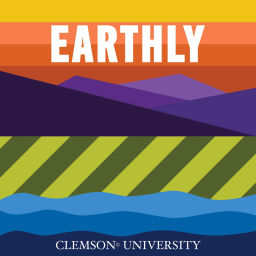
by Clemson University
<p>Earthly explains emerging issues in agriculture, horticulture, natural resources, wildlife, science, and design through experts in those fields. It is produced by Clemson University, and is part of the University's land-grant mission to impart unbiased research-based information beyond the boundaries of the academy. <br><br><b>Earthly</b> adjective</p><p>Definition of earthly</p><p><b>1</b> a: characteristic of or belonging to this earth</p><p> b: relating to the human race's actual life on this earth</p>
Language
🇺🇲
Publishing Since
9/5/2023
Email Addresses
1 available
Phone Numbers
0 available

July 9, 2024
<p>According to recent reports, South Carolina is home to seven of the top twenty most hurricane-vulnerable counties. In order of vulnerability, they include Charleston, Horry, Beaufort, Berkeley and Dorchester counties, with Charleston and Horry counties ranking third and fourth nationally, respectively.</p><p>There are many factors that go into hurricane frequency and strength. They include ocean temperature, atmospheric temperature, air moisture, and wind speed and direction. Other factors are the El Nino Southern Oscillation, known as ENSO, and Atlantic Multidecadal Oscillation, known as AMO.</p><p>Today on Earthly, Jonathan interviews Prakash Khedun. Khedun is a Clemson University climate resilience specialist.</p><p>He is going to prime us for hurricane season by helping us better understand some of the weather elements that influence the frequency and power of these storms.<br/><br/><b>Show Notes</b><br/><br/><a href='https://iri.columbia.edu/our-expertise/climate/enso/'>ENSO Resources</a><br/><a href='https://www.aoml.noaa.gov/phod/amo_faq.php'>AMO Explaination</a><br/><a href='https://www.clemson.edu/public/water/scwater/'>SC Water Resources Center</a><br/><br/></p><p>For show notes and additonal resources, visit <a href='https://blogs.clemson.edu/earthly/'>https://blogs.clemson.edu/earthly/.</a><br/><br/>Earthly is hosted and produced by Clemson University.</p>

June 21, 2024
<p>There's an old campfire song where a bear goes over the mountain to see what he could see. Well, lately, there are a lot of media reports about a lot of bears going over a lot of mountains, and what they're seeing is tract houses, hot tubs and minivans. Today on Earthly, I talk with Clemson associate professor Sherry Rodriguez about why these bears are moving into the suburbs. Here's a hint: It's not to join the homeowners association.</p><p>Rodriguez researches the human dimensions of wildlife conservation and management, and that includes human wildlife interactions and conflicts. She's also going to help us think through the human attitudes towards our encounters with animals that can kill us. And we're going to spend some time trying to understand the trend of humans risking life and limb to get close to dangerous animals in national parks. What seems like pure lunacy might be something more. <br/><br/><b> Show Notes</b><br/><br/><a href='https://www.dnr.sc.gov/swap/index.html'>South Carolina State Wildlife Action Plan</a><br/><a href='https://en.wikipedia.org/wiki/E._O._Wil'>All About E.O. Wilson</a><br/><a href='https://www.dnr.sc.gov/wildlife/species/bear.html'>SCDNR Bear website</a><br/><a href='https://www.greenvilleonline.com/story/news/local/greenville/2024/06/03/bear-encounters-rise-greenville-upstate-sc/73919915007/'>Bear sightings rise in Greenville</a></p><p>For show notes and additonal resources, visit https://blogs.clemson.edu/earthly/.<br/><br/>Earthly is hosted and produced by Clemson University.</p>

April 30, 2024
<p>The Environmental Protection Agency recently announced new drinking water limits on a category of chemicals called polyfluoroalkyl substances, or PFAS.<br/><br/>These chemicals are found in thousands of products that we use every day, such as plastics, Teflon, water proofing, fire retardant and others.<br/><br/>But they are also known as “forever chemicals” because they accumulate rather than breakdown in the environment and human body, and can cause health problems such as cancer, liver damage, low birth weight and birth defects.<br/><br/>A recent report by USA Today showed that 608 water systems across the country have detected PFAS, including some in South Carolina. Another report in the Charleston Post & Courier said freshwater fishermen are being warned to reduce their fish consumption because of PFAS.<br/><br/>In this episode of Earthly, Jonathan talks with Clemson environmental engineering associate professor Ezra Cates about PFAS and their impacts. Cates will also tell us about some innovative techniques and technologies his lab is developing to treat drinking water tainted with PFAS.<br/><br/><b>Show Notes</b><br/><br/><a href='https://cecas.clemson.edu/~ecates/'>The Cates Lab</a><br/><a href='https://www.usatoday.com/story/news/investigations/2024/04/12/pfas-forever-chemicals-new-epa-limits-drinking-water-map/73287209007/'>Hundreds of water systems exceed PFAS limits</a><br/><a href='https://news.clemson.edu/new-advances-at-clemson-university-could-help-degrade-toxic-chemicals-in-water/'>New advances at Clemson University could help degrade chemicals in water</a><br/><a href='https://news.clemson.edu/what-could-be-making-you-fat-research-says-add-forever-chemicals-to-the-list/'>Clemson researchers: forever chemicals could be making you fat</a><br/><br/></p><p>For show notes and additonal resources, visit https://blogs.clemson.edu/earthly/.<br/><br/>Earthly is hosted and produced by Clemson University.</p>
Pod Engine is not affiliated with, endorsed by, or officially connected with any of the podcasts displayed on this platform. We operate independently as a podcast discovery and analytics service.
All podcast artwork, thumbnails, and content displayed on this page are the property of their respective owners and are protected by applicable copyright laws. This includes, but is not limited to, podcast cover art, episode artwork, show descriptions, episode titles, transcripts, audio snippets, and any other content originating from the podcast creators or their licensors.
We display this content under fair use principles and/or implied license for the purpose of podcast discovery, information, and commentary. We make no claim of ownership over any podcast content, artwork, or related materials shown on this platform. All trademarks, service marks, and trade names are the property of their respective owners.
While we strive to ensure all content usage is properly authorized, if you are a rights holder and believe your content is being used inappropriately or without proper authorization, please contact us immediately at [email protected] for prompt review and appropriate action, which may include content removal or proper attribution.
By accessing and using this platform, you acknowledge and agree to respect all applicable copyright laws and intellectual property rights of content owners. Any unauthorized reproduction, distribution, or commercial use of the content displayed on this platform is strictly prohibited.